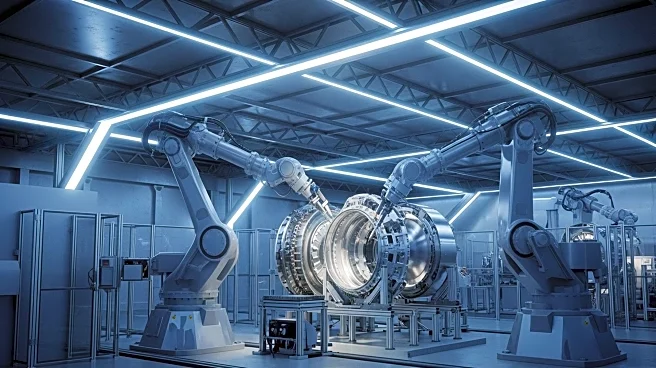What's Happening?
The aerospace industry is undergoing a significant transformation through the adoption of disruptive technologies such as artificial intelligence and industrial robotics. These advancements are reshaping
manufacturing processes, enabling companies to optimize production, anticipate disruptions, and enhance supply chain reliability. The integration of digital tools supports continuous innovation, allowing firms to adapt to evolving customer needs and introduce smarter, safer, and more sustainable solutions. Companies are actively participating in technology-focused initiatives to digitalize operations, employing robotics and IT to automate production and improve product traceability. This shift towards digitalization is not only about increasing efficiency but also about building resilience and securing long-term competitiveness.
Why It's Important?
The adoption of disruptive technologies in aerospace manufacturing is crucial for enhancing operational efficiency and contributing to sustainable development. By leveraging precise data analytics, companies can improve production planning, material efficiency, and reduce waste, thereby optimizing energy consumption. This digital transformation also addresses skilled labor shortages by retraining employees for specialist roles, enhancing workforce capabilities. The integration of technology with human expertise empowers employees to focus on higher-impact roles, fostering growth and employee retention. As the industry evolves, the demand for new expertise in areas like data analysis and robotics maintenance will define its future, strengthening competitiveness and attracting talent.
What's Next?
The continued digitalization of aerospace manufacturing processes is expected to create demand for new skills and expertise, such as data analysis and process optimization. Companies embracing these technologies will gain a competitive edge in hiring, increasing capacity and productivity. The integration of technology with human development will strengthen the industry's ability to attract talent in a challenging labor market. As digitalization progresses, companies will need to invest in training and reskilling to fully realize the potential of these technologies, ensuring that the human workforce remains integral to the industry's success.
Beyond the Headlines
The digitalization of aerospace manufacturing processes not only enhances productivity but also addresses ethical and environmental responsibilities. By optimizing energy consumption and reducing waste, companies contribute to decarbonization efforts and align with environmental goals. The ability to share data securely across the supply chain fosters transparency and trust, improving collaboration and resilience. This integration of technology and human expertise empowers individuals to make greater contributions, creating a more inspired and capable workforce. As companies continue to embrace digitalization, they position themselves as leaders in sustainable and responsible manufacturing practices.








